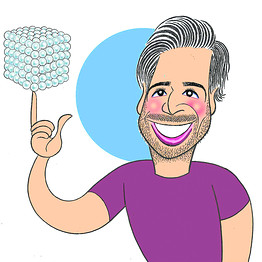
Craig Zucker. Source of caricature: online version of the WSJ article quoted and cited below.
(p. A11) Mr. Zucker is the former CEO of Maxfield & Oberton, the small company behind Buckyballs, an office toy that became an Internet sensation in 2009 and went on to sell millions of units before it was banned by the feds last year.
A self-described “serial entrepreneur,” Mr. Zucker looks the part with tussled black hair, a scraggly beard and hipster jeans. Yet his casual-Friday outfit does little to subdue his air of ambition and hustle.
Nowadays Mr. Zucker spends most of his waking hours fighting off a vindictive U.S. Consumer Product Safety Commission that has set out to punish him for having challenged its regulatory overreach. The outcome of the battle has ramifications far beyond a magnetic toy designed for bored office workers. It implicates bedrock American notions of consumer choice, personal responsibility and limited liability.
. . .
In August 2009, Maxfield & Oberton demonstrated Buckyballs at the New York Gift Show; 600 stores signed up to sell the product. By 2010, the company had built a distribution network of 1,500 stores, including major retailers like Urban Outfitters and Brookstone. People magazine in 2011 named Buckyballs one of the five hottest trends of the year, and in 2012 it made the cover of Brookstone’s catalog.
Maxfield & Oberton now had 10 employees, 150 sales representatives and a distribution network of 5,000 stores. Sales had reached $10 million a year. “Then,” says Mr. Zucker, “we crashed.”
On July 10, 2012, the Consumer Product Safety Commission instructed Maxfield & Oberton to file a “corrective-action plan” within two weeks or face an administrative suit related to Buckyballs’ alleged safety defects. Around the same time–and before Maxfield & Oberton had a chance to tell its side of the story–the commission sent letters to some of Maxfield & Oberton’s retail partners, including Brookstone, warning of the “severity of the risk of injury and death possibly posed by” Buckyballs and requesting them to “voluntarily stop selling” the product.
It was an underhanded move, as Maxfield & Oberton and its lawyers saw it. “Very, very quickly those 5,000 retailers became zero,” says Mr. Zucker. The preliminary letters, and others sent after the complaint, made it clear that selling Buckyballs was still considered lawful pending adjudication. “But if you’re a store like Brookstone or Urban Outfitters . . . you’re bullied into it. You don’t want problems.”
. . .
Maxfield & Oberton resolved to take to the public square.On July 27, just two days after the commission filed suit, the company launched a publicity campaign to rally customers and spotlight the commission’s nanny-state excesses. The campaign’s tagline? “Save Our Balls.”
Online ads pointed out how, under the commission’s reasoning, everything from coconuts (“tasty fruit or deadly sky ballistic?”) to stairways (“are they really worth the risk?”) to hot dogs (“delicious but deadly”) could be banned.
. . .
. . . in February [2013] the Buckyballs saga took a chilling turn: The commission filed a motion requesting that Mr. Zucker be held personally liable for the costs of the recall, which it estimated at $57 million, if the product was ultimately determined to be defective.
This was an astounding departure from the principle of limited liability at the heart of U.S. corporate law.
. . .
Given the fact that Buckyballs have now long been off the market, the attempt to go after Mr. Zucker personally raises the question of retaliation for his public campaign against the commission. Mr. Zucker won’t speculate about the commission’s motives. “It’s very selective and very aggressive,” he says.
For the full interview, see:
SOHRAB AHMARI, interviewer. “THE WEEKEND INTERVIEW with Craig Zucker; What Happens When a Man Takes on the Feds; Buckyballs was the hottest office game on the market. Then regulators banned it. Now the government wants to ruin the CEO who fought back.” The Wall Street Journal (Sat., August 31, 2013): A11.
(Note: ellipses, and bracketed year, added.)
(Note: the online version of the interview has the date August 30, 2013, and has the title “THE WEEKEND INTERVIEW; Craig Zucker: What Happens When a Man Takes on the Feds. Buckyballs was the hottest office game on the market. Then regulators banned it. Now the government wants to ruin the CEO who fought back.”)

